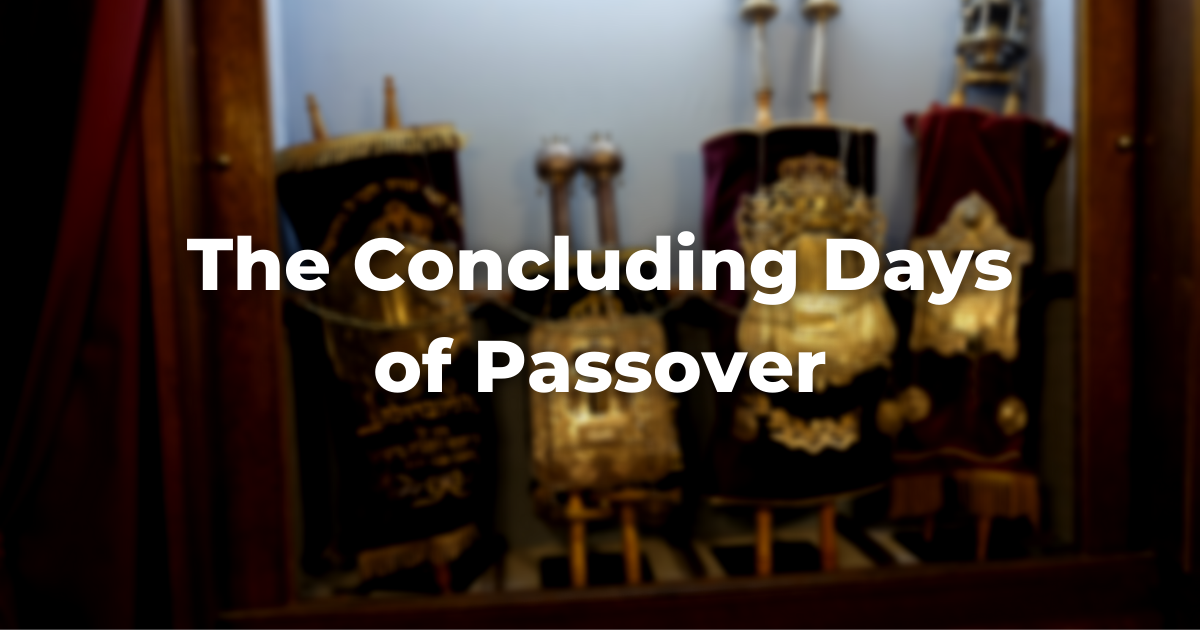The seventh and eighth days are the concluding days of Passover and are full festival days. (In Israel, there is no eighth day at all and the festival concludes at the end of the seventh day.) The liturgy for these days follows the same format as the first two days, except that the shortened version of Hallel is said and the She-he ̇eyyanu blessing is neither recited when the festival candles are kindled nor included as part of Kiddush.
Candle Lighting
No later than eighteen minutes before sundown candles are lit for the seventh day of Passover. (They are kindled one hour later on the eighth day.) The standard blessing over festival candles, barukh attah adonai, eloheinu, melekh ha-olam, asher kidd’shanu b’mitzvotav v’tzivvanu l’hadlik neir shel yom tov (“Praised are You, Adonai, our God, Sovereign of the universe, who, sanctifying us with divine commandments, has commanded us to kindle the festival lamp”) is recited.
On Shabbat, the blessing is barukh attah adonai, elo- heinu, melekh ha-olam, asher kidd’shanu b’mitzvotav v’tzivvanu l’hadlik neir shel shabbat v’shel yom tov (“Praised are You, Adonai, our God, Sovereign of the universe, who, sanctifying us with divine commandments, has commanded us to kindle the Sabbath and festival lamp”).
On the eighth night of Passover, the kindling of a flame would not be permitted, as the candles are not being lit prior to the holiday but on it. But while fire cannot be kindled on the holiday it may be transferred, so it has become customary to light a twenty-four-hour candle at the same time the candles are lit on the seventh night so that on the eighth night the candles can be lit merely by transferring the flame.
In addition, a special Yizkor candle is lit just prior to the formal holiday candles for the eighth day by those who will be reciting the Yizkor Service the following morning. There is no blessing recited when kindling this memorial candle, although many prayerbooks include appropriate devotional material to recite just before doing so.
Hallel
The use of the shortened version of Hallel on the last two days of Passover is an anomaly, as these are the only festival days of the year on which the full Hallel is not recited. The explanation for this is based on a noble tradition that forbids any sort of response to deliverance that could be misinterpreted as gloating over the downfall of the enemy.
An old midrashThis word is used in two ways, as both a concept and a literature. As a concept, midrash is the expansive interpretation of biblical texts. The term is used to describe the practice of rabbinic interpretation. As a text, it refers to specific collections of interpretations, particularly from the third to ninth centuries in the Land of Israel and Babylonia. Plural: Midrashim
Read more depicts the Israelites singing with joy at their deliverance at the Sea of Reeds and the angels in heaven joining in. God, the legend goes, was not pleased and rebuked these angels with the words: “My creatures are drowning and you sing songs of praise?” (Megillah 10b:26). As a result, the custom grew up to abbreviate the Hallel as a way of nodding to the fact that salvation came to Israel through the suffering of others.
Alternative theories explain that the last days of Passover have a different feel to them than the last days of Sukkot. On Sukkot, since each day has a value of its own (as symbolized by the unique set of sacrifices that were brought on each of its days), each day deserves its full Hallel. The final days of Passover, however, are merely a continuation and conclusion of the first days and, as such, do not.
Torah Readings
Two scrolls are taken out of the Ark on the seventh day of Passover. From the first scroll, we read Exodus 13:17–15:26, which focuses on the events at the Sea of Reeds. The maftir is then read from the second scroll, but it is the same reading as on all the intermediary days of Passover.
The haftarah is 2 Samuel 22:1–51, which echoes the themes of the TorahRefers to the first five books of the Hebrew Bible, the Tanakh, also called the Five Books of Moses, Pentateuch or the Hebrew equivalent, Humash. This is also called the Written Torah. The term may also refer to teachings that expound on Jewish tradition. Read more reading. Two scrolls are also taken from the Ark on the eighth day. The reading on the eighth day is Deuteronomy 15:19–16:17. If, however, the eighth day of the festival falls on Shabbat, the reading begins with Deuteronomy 14:22 and the number of aliyot is increased from five to seven. The maftir is the same as the other days and the haftarah is Isaiah 10:32–12:6, which relates a vision of the ultimate redemption of mankind.
Yizkor is also recited on the eighth day of Passover after the conclusion of the haftarah.
Adapted with permission from The Observant Life.
Authors
-

-

The Observant Life: The Wisdom of Conservative Judaism for Contemporary Jews distills a century of thoughtful inquiry into the most profound of all Jewish questions: how to suffuse life with timeless values, how to remain loyal to the covenant that binds the Jewish people and the God of Israel, and how to embrace the law while retaining an abiding sense of fidelity to one’s own moral path in life. Written in a multiplicity of voices inspired by a common vision, the authors of The Observant Life explain what it means in the ultimate sense to live a Jewish life, and to live it honestly, morally, and purposefully. The work is a comprehensive guide to life in the 21st Century. Chapters on Jewish rituals including prayer, holiday, life cycle events and Jewish ethics such as citizenship, slander, taxes, wills, the courts, the work place and so much more.
View all posts






